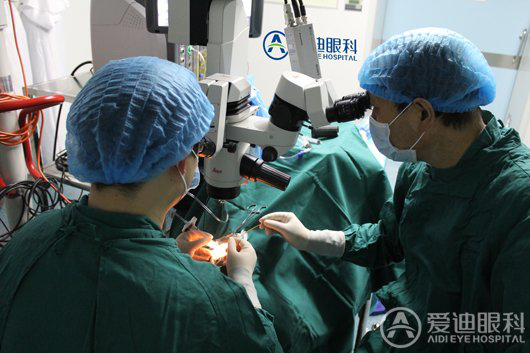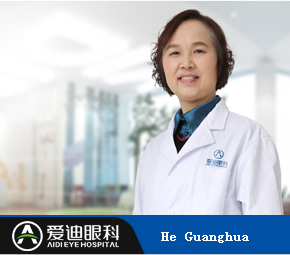Aidi Eye Hospital challenges the “unprecedentedly difficult” operation for fundus oculi disease.
On June, a common Saturday night, Zhou Qiang (alias) was still tossing and turning in bed at Aidi Eye Hospital although it was very late, for he would have an operation the next day which could dictate whether he still had to live in a dark world for the coming 10 or more years. Lights were also on in the doctor office at the other end of the wards, because a panel of doctors designated for Zhou Qiang was still making plans for the operation tensely. They knew what was coming would be a rare and extremely difficult fundus vitrectomy combined surgery.

As a father, the 39-year old Zhou Qiang from West Sichuan yearns for brightness to such an extent that others can’t imagine. His sight was greatly impaired because of a 15-day serious fever when he was only 3. Therefore, he was always at the first row of the classroom since primary school, but even so, he couldn’t see the blackboard clearly. Finally one day, he was horrified to find that what he saw with his left eye was completely red. Although he had an operation, he lost sight of the left eye. What's worse, an accident in 1996 made him blind because his right eye suffered retinal detachment. Fortunately, his sight recovered to 0.2 after a vitrectomy operation at West China Hospital, allowing him to look after himself although still read with difficulty.
The nightmare was nonetheless over. Since 2002, Zhou Qiang began to lost sight in the right eye because of the damage retina and was later completely blind. The operation to regain sight could cost thousands of yuan, which was an enormous amount for a rural family. “He should have done the operation 5 years ago, but his wife was also sick. We had to save only one of them for lack of money”, said Zhou’s mother, her eyes teeming with tears. “Now that we are a little better off, we will make the final bet at the price of everything.”
Though this unfortunate family was determined to make the final bet, they couldn’t find the hospital willing to help them. “We went to more than 10 major hospitals in Beijing and Shanghai, but they told us that they didn't want to trouble themselves because the operation was too difficult and the patient was one-eyed.” Out of desperation, the family came to Chengdu Aidi Eye Hospital, with a final glimmer of hope because Prof. Hu Yuzhang was here. Sixteen years ago, it had been him to let Zhou Qiang see the world again; this time, Zhou was also not let down.
Once Zhou Qiang was received, Aidi Eye Hospital immediately established a panel of doctors led by Prof. Hu Yuzhang, founder of vitrectomy surgery at West China Hospital. The panel also included Liu Ronghua, standing committee member of the ocular trauma team of Chinese Ophthalmological Society and professor at West China University of Medical Sciences; Deng Yan, master at West China School of Medicine, Sichuan University, Sichuan University and chief of Department of Special Examination at Aidi Eye Hospital; and Zhou Bo, master at West China School of Medicine, Sichuan University and surgeon of fundus vitrectomy operation.
“It is rare to be seen even in the whole country to perform such sophisticated vitrectomy surgery on the same eye, for the same person again after 16 years”, said Zhou Bo, surgeon at Aidi Eye Hospital. “The operation allowed for no error because the patient was one-eyed. It is a great pressure for both the doctor and the patient since failure means life-long blindness.” Zhou Bo is also a member of the ophthalmologist group on WeChat, together with over 90 other ophthalmologists in Sichuan. When he first sent the message about the combined surgery via the WeChat, his friends were all excited. They paid close attention to the surgery. Just before Doctor Zhou followed Prof. Hu Yuzhang into the operating room, he received a greeting from the WeChat group which said: “Good luck, friend. Take care!”
The combined surgery finally started at 11:00a.m., June 30. In this standardized operation, the once-unimaginable combined surgery became a perfect cooperation platform for ophthalmologists: silicone oil was taken out, retina was restored…The 2-hour long operation culminated when Prof. Hu performed the final step of gas injection into the eyeball.
The next time when our reporter met Zhou Qiang, he was quietly lying on the bed at Aidi Eye Hospital with relatives surrounding him. He was full of delight and hope because the surgery was a success. “I feel it is effective, because I could already see forceps in doctors’ hands during the operation”, whispered Zhou.
It is said that patients with symptoms of retinal detachment in some other countries can apply for helicopter emergency rescue. However, there is no emergency green channel for eye diseases so that patients have to start from registration while in pain and wait for their turns to have the operation. Some patients may sustain life-long blindness because of missing the prime time for treatment. As a result, a team of ocular fundus diseases experts at Aidi Eye Hospital, led by Hu Yuzhang, has opened up the first “72h Green Channel for RetinaeRetinal Detachment” in China to conduct emergency rescue, treatment and operation on patients suffering from eye diseases such as retinal detachment.
Prof. Hu Yuzhang emphasized that the 72-hour emergency treatment means the fast access to hospital treatment, posture guidance, preoperative examination and surgery. Once problem occurs at the fundus, patients should receive immediate treatments and doctors should detail the diagnosis and treatment plans right away to save the patients’ vision as much as possible. While the opportunity is within the 72 hours after symptoms occur, so every second counts. Moreover, not every patient with retinal detachment symptoms requires surgery because some patients immediately sent to the hospital may quickly recover after timely and proper treatments by the doctor. In a word, the earlier patients go to hospitals, the brighter prospects they have for recovery.











